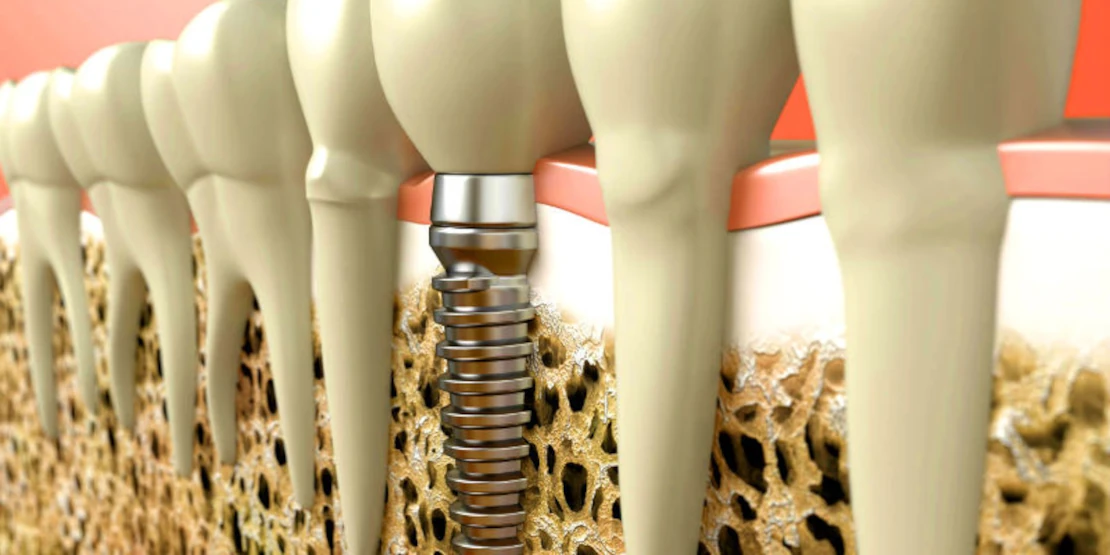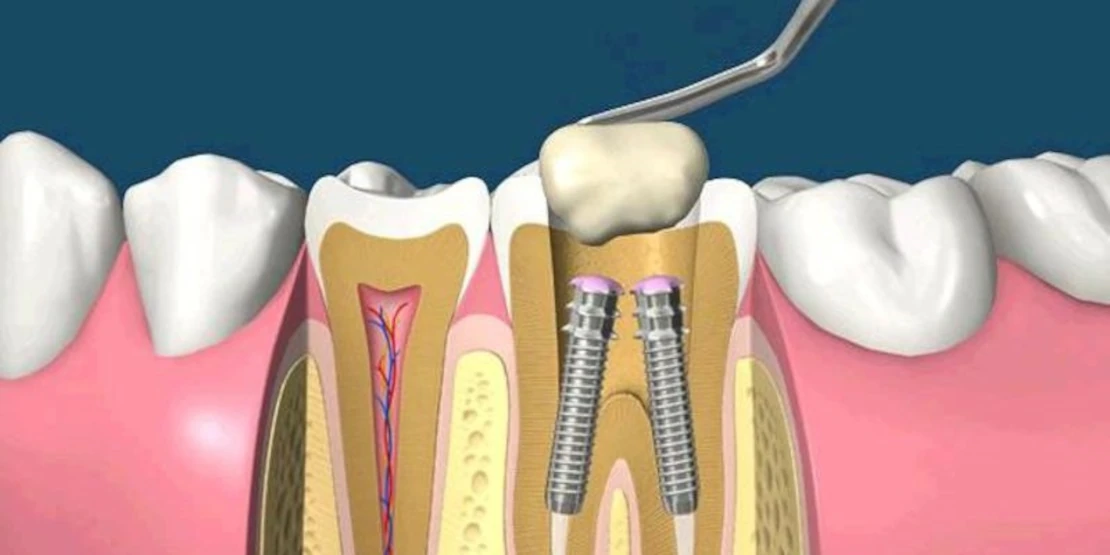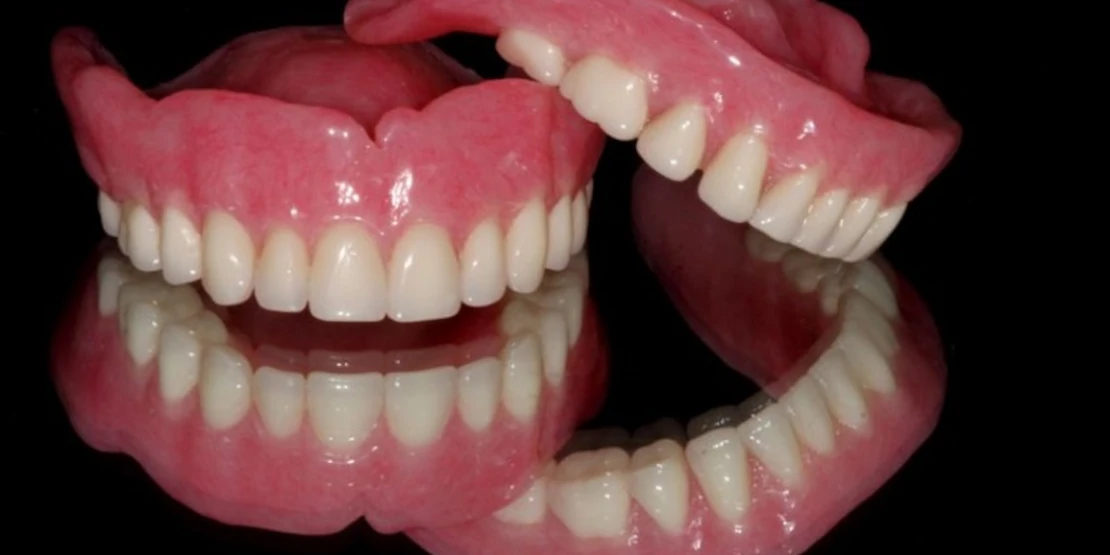
Which to choose for tooth replacement - a post or dental implants?
To decide on a solution, you need to know the difference between these orthopedic designs. First and most importantly, the difference between a post and an implant — is the purpose and scope of use.
A post is a thin fiberglass, titanium, or steel rod that is placed in dental canals to strengthen the crown of a decayed tooth. Pins allow you to preserve the "native" root of the tooth and restore the crown portion with fillings or artificial dental crowns.
As for implants, they are titanium or zirconium "artificial roots" that are implanted into the bone tissue of the jaw or periosteum and serve as a support for future prosthetics (the same installation of a crown). In other words, a post is an auxiliary restorative structure, while an implant is a prosthetic structure.

You will not receive a dental post if there is severe destruction of the tooth wall and root, or if the tooth wall is not thick enough to accommodate the post. In addition, a dental post is not used for patients with tooth decay, periodontal disease, granulomas or cysts.
Can an implant be placed if a crown is available?
In fact, there is no unambiguous answer to this question. Of course, placing a crown (prosthetics) is a more reliable and better procedure.
However, for a crown, it will be necessary, first of all, to grind the enamel from the neighboring teeth, and this can hardly be called a positive point. As far as implants are concerned, they usually do not require boring.
Are there many contraindications to dental implants?
Dental implantation, like any surgical procedure, has certain contraindications. Absolute restrictions include malignant tumors, diabetes mellitus, tuberculosis, immune system disorders (HIV, AIDS) and blood clotting disorders, acute diseases of the nervous system, blood vessels or joints.
In addition, implantation is not recommended or allowed after preliminary treatment for inveterate smokers, with poor oral hygiene. In general, contraindications are few and the operation is contraindicated only in acute and serious stages of diseases. Read more in the article "Dental Implantation"
The doctor said I have bone atrophy, what is that?
Bone atrophy is a decrease in bone volume that occurs immediately after tooth extraction. It is natural that the normal blood supply within the bone is achieved by the load that is transferred through the root of the natural tooth when chewing food.
As soon as a tooth is removed, the metabolic processes in the bone stop and the bone shrinks and becomes smaller. This often prevents the implantation of teeth, as it is not possible to fix an implant in a small bone volume.

Do I need to stop smoking for the surgery?
Smoking is not an absolute contraindication for dental implants, but in order to reduce the risk of possible rejection of implants (because nicotine significantly reduces the body's defenses), it is recommended to give up altogether or at least reduce the number of cigarettes consumed to a minimum. Two weeks before surgery and for the same time after implant placement.
Is the implantation done under anesthesia?
No, dental implants are performed under anesthesia - only the implant area is frozen. If it is necessary to implant a large number of structures in the jaw, anesthesia may be considered, but it is often not justified.
In addition, you may be offered sedation - you will be in creation but in a relaxed state through the administration of sedatives that reduce the body's nervous tension.

Will I have to go without teeth after implants?
The issue of aesthetics after implant placement is solved by fixing removable prostheses. Yes, it is not very convenient, but for the time of implant engraftment, i.e. their complete fusion with the bone tissue, the load on the structures should be reduced.
Therefore, immediately after the implants are implanted in the bone, impressions are taken for the fabrication of temporary removable butterfly dentures. They are aesthetically pleasing and allow you to chew your food properly.

They will be fixed exclusively on the gums (in case of a large number of missing teeth) due to the "suction cup" effect, or cling to the base of the natural teeth in the oral cavity with special hooks.
What is implant rejection and how can you tell if an implant has failed to take root?
Dental implant rejection occurs in case of its unprofessional installation, lack of proper oral hygiene, improperly selected design.
Characteristic symptoms are: sharp pain in the area of the implant, the appearance of pus or bleeding, redness and swelling of the gums, mobility of the implant together with the crown, possibly also an increase in body temperature.

The implant can also be rejected after several years of active use. Among the main causes are various traumas, disorders of the body's immune system.
What kind of dentures can be placed on implants?
Implants can be used to anchor absolutely any kind of dentures - removable dentures, dental bridges or single dental crowns. If they are fixed on the implants, the service life of the structures increases by 2-3 times. As for removable dentures, they do not need to be removed every day, but only periodically for a thorough oral hygiene routine.
What is the lifespan of implants and dentures?
The service life of dental implants is at least 10 years, but in the absence of abnormalities on the part of the body, if properly installed, they can even outlive the patient, so, as a rule, implants last on average 20 years or more.
As for implant-supported prostheses, their service life is 10-15 years, and the best quality ones - more than 20 years (we are talking about zirconium dioxide crowns). When replacing dentures, implants are not traumatized, so they do not need to be inserted again.
What is the warranty on dental implants?
There are several types of warranty: for the implants themselves (given by the manufacturer and starting from 10 years or more), for the prostheses (given by the clinic, usually for one year), and for the placement of the implants (also given by the attending physician and also for one year). If there are any problems with the implants, it is necessary to investigate whose fault it was that they occurred.

By knowing the whole truth about implants, you will be able to make the decision to get them if necessary. You don't have to look at the fact that it costs a lot. Nothing is more expensive than health anyway.
